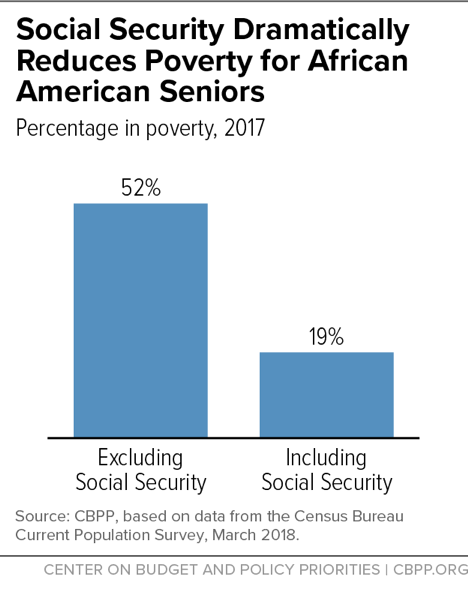BEYOND THE NUMBERS
Social Security is a critical source of income for African American people of all ages and has reduced economic disparities between African American and white families. That’s especially important given recent findings from an Urban Institute study that we commissioned, on African American economic security and the role of Social Security, which details the economic barriers that African American workers face.
African American seniors are likelier than other seniors to face financial insecurity in retirement, the study found. (That’s consistent with other research that has found a significant racial retirement wealth gap.) They are less likely to have financial assets, retirement accounts, and home equity than white seniors — and, when they do, their value is substantially less, the Urban study found. When workers of color and white workers have similar circumstances, they make similar choices about participation in a retirement plan and contribution levels. But African American workers are less likely to be offered workplace retirement plans and likelier to work in low-wage jobs with little margin for savings.
Due to those barriers, Social Security makes up a greater portion of African American seniors’ retirement portfolios, supporting those with few other sources of income. Social Security lifts 1.5 million Black seniors out of poverty, cutting the poverty rate for that group by nearly two-thirds, our own research has shown. (See figure.)
Several features of Social Security’s benefit formula also ameliorate the labor market inequities that Black workers face, including lower wages and higher unemployment at every level of education. Social Security’s progressive benefit formula replaces a higher share of pre-retirement wages for workers with lower lifetime earnings. In addition, the benefit formula is based on the highest 35 years of earnings; it discards other years, mitigating the impact of spells of unemployment or low wages.
In addition, Social Security’s importance to African American families goes beyond retirement. In fact, the share of working-age African American adults who receive Social Security benefits is nearly twice as large as the share of working-age people as a whole. That’s because Social Security provides benefits for families when a breadwinner dies or becomes disabled, risks that the Urban study found disproportionately affect African American workers. Persistent racial disparities in health care access and quality — as well as in access to food, affordable housing, high-quality schools, and economic opportunity — mean African American workers are likelier to become disabled or die before reaching retirement.
Due to the higher disability and premature death rates among African American workers, African American children are also likelier to receive Social Security benefits than other children. Children can qualify for benefits if a breadwinning parent dies, becomes disabled, or retires. Social Security also indirectly helps children who live with a parent or another relative who receives benefits, which can help the whole family stay afloat. These benefits are particularly important for Black children, who are likelier than white children to live with grandparents. Whether directly or indirectly, Social Security keeps many African American children out of poverty.

